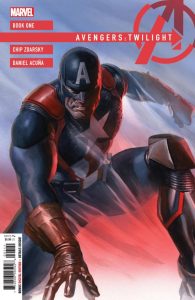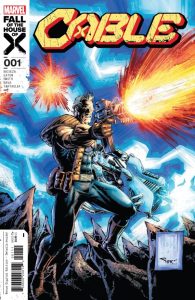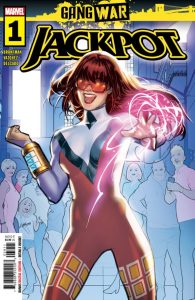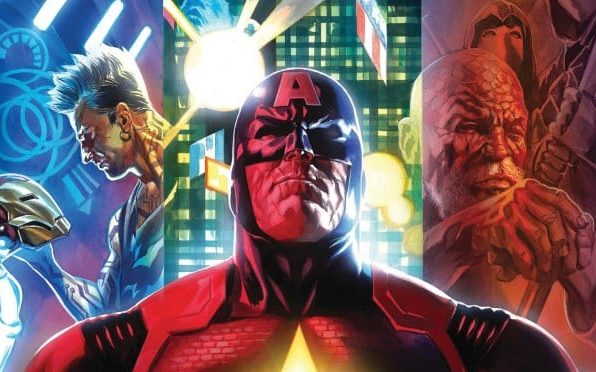Welcome back to the Marvel Rundown! This week, it’s mini mayhem, as the Rundown Crew checks out three new number ones launching from the House of Ideas: How do Avengers: Twilight #1, Cable #1, and Jackpot #1 stack up?
What did you think of this week’s batch of fresh Marvel Comics, True Believers? The Beat wants to hear from you! Give us a shout-out, here in the comment section or over on social media @comicsbeat, and let us know what you’re thinking.

Avengers: Twilight #1
Avengers Twilight #1 sets up a world where most of the Avengers are dead. A US government and S.H.I.E.L.D. content to crush civil liberties. There’s a new Avengers team destroying other countries. Meanwhile, an older Captain America wanders a future New York City miserable. If this sounds familiar, stories about old superheroes on one last crusade inevitably invite comparisons to Frank Miller’s landmark work The Dark Knight Returns. Writer Chip Zdarsky and artist Daniel Acuña at least seem aware of what inspires them (letters are from Cory Petit). For the most part, they’re in open dialogue with Miller’s comic as well as Mark Waid and Alex Ross’ Kingdom Come. A couple sequences openly mirror ones from the former especially the last ten or so pages. Much like in Miller’s comic, Zdarsky weaves in his own brand of political commentary. Subplots about the surveillance state, disinformation, and American imperialism are all important to the story so far. Acuña’s painted art works to match the style of the Dark Knight creative team of Miller, Klaus Jansen, and Lynn Varley. The entirety of the first issue though doesn’t make for a compelling opening. The Dark Knight Returns resonates because it throws an older and more bitter Bruce Wayne into a world worse than when he left it. A Batman who may no longer be able to face his foes and grappling with his legacy. The potential conflict of an older and more frail Steve Rogers returning to action minus the super soldier serum gets thrown out with the last ten pages. It’s possible future issues will deal more with the legacy and idea of Captain America (and The Avengers). This issue though not so much. — D. Morris

Cable #1
Having written the most stories featuring the character, one might say Fabian Nicieza knows a thing or two about Nathan Christopher Charles Dayspring Askani’son Summers… but what’s he know about a young, hip Kid Cable? Unsurprisingly, a lot! Nicieza has a great handle on the voices of both of these characters, as they kick off a hunt for the mystery of the Neocracy, a future threat more dangerous than anything mutantkind has ever faced. The Neocracy themselves- a group of evolved humans dedicated to making all people into homogenous energy beings – feel, unfortunately, homogenous. They’re propped up as an enormous threat to the future, but they feel far too generic to feel truly dangerous. Scot Eaton, along with inkers Cam Smith & Victor Nava, and colorist Java Tartaglia don’t do these characters justice, making these evolved beings look like floating pink blobs (and not in the Glob Herman way). However, the art teams nail the rest of the issue, with great character work for both Cables (with some beefy arms and sandwiches for the elder Summers) and outstanding dramatic action throughout the issue. Nicieza made his name in the era of compression, and that’s absolutely evident here. The issue moves at a rapid pace, jumping from scene to scene in a way that makes it impossible to guess where the story is going. VC’s Joe Sabino deftly manages the barrage of dialogue here, making sure it flows smoothly against the speedy pace. It’ll be interesting to see how much this winds up slotting into the Fall of X, or if it hews closer to forging its own path. —Cy Beltran

Jackpot #1
Mary Jane Watson’s bizarre and winding adventure with everyone’s favorite new Spider-Man side character Paul continues in a new one shot that sees MJ out on her first full superhero adventure as JACKPOT. Writer Celeste Bronfman offers up a fun and witty script that nails MJ’s voice and manages to find some pathos amid a strange status quo. Bronfman roots MJ’s drive into heroism in both the loss of her magical, time tossed children and her longrunning sense of guilt surrounding her family history. I don’t understand the reason for turning one of the most important grounding elements of Spidey’s world into a superhero but this issue offers up an interesting take that at least makes me curious to see what else Bronfman does with the new Jackpot and Black Cat series. Joey Vasquez and Eric Gapstur offer up dynamic and expressive art with cool action scenes. Edgar Delgado and Erick Arciniega embellish the linework with a bright pop art flavor that suits MJ’s free spirited attitude. VC’s Ariana Maher brings it all together with some solid letters including flashy sound effects. This issue doesn’t justify the existence of Jackpot as a concept, but it is a great showcase for some talented storytellers. — Tim Rooney
Next Week: The Resurrection of Magneto and Cable finishes his massive sandwich!









Seriously? Jackpot was one of the most amateurishly crafted comics I’ve read, and I’ve read a lot of comics. The pacing was terrible, probably because the rushed art by
Gapster indicates a last minute change to the ending. Bronfman’s ear for dialogue is tin with groaning clunkers that were tiw: the exact opposite of wit. MJ’s deus ex machina powers were more nonsensical than ever. Since when does having “vine” power mean you can fly like Superman? And when you take Mary Jane Watson – in a story featuring Francine Frye, who MJ charmingly disarmed and took down without any powers at all, JUST her acting skills, in Nick Spencer’s ASM 25 – and make MJ a terrible actress? You should be sent to remedial serial writing school. And when you have Mary Jane – who has never been powerless in her entire depiction except under Zeb Wells, whose run has been a masterclass in how to not write women – frame this bizarre descent into superheroing as being “empowering” when she is constantly being monitored by a man who controls her power levels remotely: you shouldn’t be allowed to touch another female character ever again. And you need to check your misogyny, internalized or otherwise.
Comments are closed.